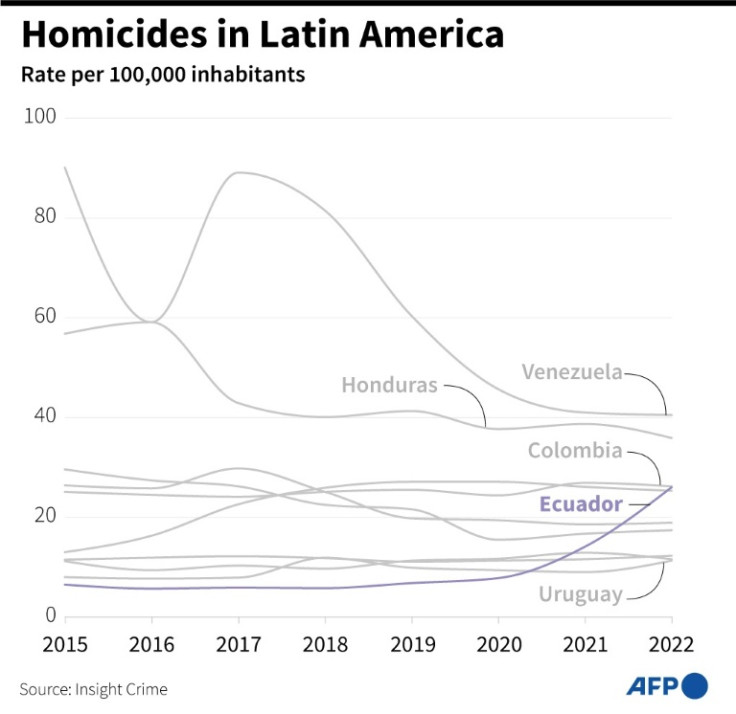Ecuador Votes In Presidential Election Dominated By Security Woes

Ecuadorans head to the polls Sunday in a presidential election tarnished by the murder of a top candidate, which cast a spotlight on the violence ravaging a once-peaceful nation caught up in the global drug trade.
The eight presidential candidates have prioritized promises to crack down on organized crime, all while campaigning in bulletproof vests.
The small South American country has in recent years become a playground for foreign drug mafia seeking to export cocaine, stirring up a brutal war between local gangs.
Several political assassinations marked the run-up to the vote, with the murder of serious presidential contender Fernando Villavicencio just 11 days from the election underscoring the challenges facing the country.
"These are completely atypical elections, in a situation basically of horror that Ecuador is going through... due to the existing violence, but which manifested itself in a more acute and atrocious way" with Villavicencio's murder, political scientist Anamaria Correa Crespo told AFP.
In 2022, the country hit a record of 26 murders per 100,000 inhabitants, higher than the rate in Colombia, Mexico and Brazil.
President Guillermo Lasso called the snap election after he dissolved the opposition-dominated Congress in May to avoid an impeachment trial just two years after his election.
Leading the polls before the murder was Luisa Gonzalez, 45, a lawyer from the leftist party of former president Rafael Correa.
However, observers say the assassination may have shaken up the race.
Villavicencio, who was polling second before his murder, was replaced last-minute by another journalist, Christian Zurita.
Hours ahead of the vote, Zurita said he was receiving death threats on social media.
"The threats against my life and my team will not stop us, but they are forcing us to take greater security protocols," he wrote on X, formerly Twitter, adding that his party had alerted authorities and election observers.
Political analysts say the candidate who has seen the biggest boost to his popularity is 40-year-old right-wing businessman Jan Topic.
Nicknamed "Rambo," the former paratrooper and sniper with the French Foreign Legion has vowed to wipe out criminal gangs and build more prisons, emulating El Salvador's Nayib Bukele.
Other leading candidates are right-wing former vice-president Otto Sonnenholzner, and leftist Indigenous attorney Yaku Perez.
In one of the world's most biodiverse countries, two key referendums are taking place on Sunday alongside the election.
One will ask voters to choose whether to continue oil drilling in the Amazon, and another focuses on whether to forbid mining activities in the Choco Andino forest.
To win in the first round a candidate must capture 40 percent of the votes or come 10 points ahead of their nearest competitor. A potential run-off is scheduled for October 15.
The new president will take office on October 26, and will only serve the remainder of Lasso's term, a year and a half.
Voters will also elect members of the 137-seat parliament.
Soldiers have been deployed across the country to secure the vote, which begins at 7:00 am (1200 GMT) and closes at 5:00 pm (2200 GMT).
Initial results are expected to trickle in the same night, with a final tally expected in 10 days.


© Copyright AFP {{Year}}. All rights reserved.



















